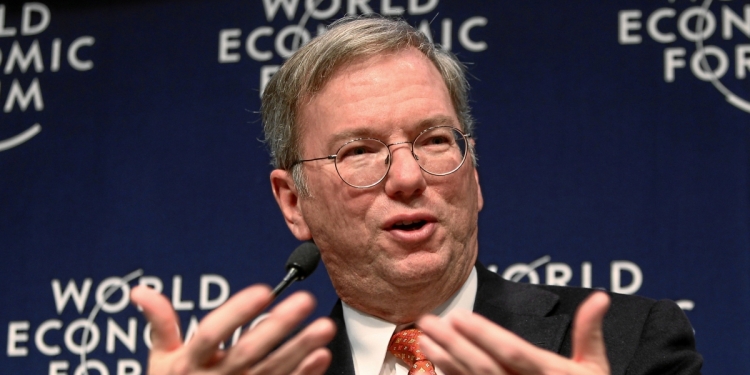Former Google CEO Eric Schmidt who currently is the chairman of the US Department of Defense’s Innovation Board has told the BBC in an interview that Huawei poses challenges to national security. At the moment, the UK is still deciding whether to allow Huawei to roll out its 5G mobile networks as Western countries are being pressured by the US to exclude the Chinese telecommunications giant.
Eric has said that there’s no question that Huawei has engaged in some practices that are not acceptable in national security. He told the BBC it is possible to consider Huawei as a “signals intelligence” similar to spy agencies like the UK’s GCHQ or US’ NSA.
He added that information from Huawei routers would ultimately end up in the hands that would appear to be of the state. “However that happened, we’re sure it happened”, the former Google CEO said. Other experts have claimed that despite Huawei’s assurances, the Chinese firm would have no choice but to hand over data to their government because of national security laws.
The West needs to compete with Huawei
However, he has urged the West to respond by competing with China and its technologies, rather than disengaging. He shared that the real issue with Huawei lies in the challenge to US leadership it represents, which is a Chinese firm operating at a global stage that’s building a better product than its competitors.
He told the BBC that it is extremely important that we have choices. The answer to Huawei is to compete by having a product and a product line that is as good. He admitted that over his long career in Silicon Valley, he had underestimated China’s ability to innovate. He said he has carried the prejudices about China in his working years with them.
“That they’re very good at copying things, that they’re very good at organising things, that they throw large numbers of people at it. But they’re not going to do anything new. They’re very, very good at stealing, if you will, our stuff. Those prejudices need to be thrown out.”
“The Chinese are just as good, and maybe better, in key areas of research and innovation as the West.”
“They’re putting more money into it. They are putting it in a different way, it is state-directed in a way that is different from the West. We need to get our act together to compete.”
Eric has denied that the Chinese model of state-directed investment in technology is more successful than a free-market model. He said that the west needs to make the most of its strengths by investing more in research funding, ensuring greater collaboration between private, state and academia, and to remain open to the best talent from around the world. He said that most people would prefer to live and work in the West than to work in China.
Huawei says accusations not backed by evidence
Huawei has repeatedly denied security accusations hurled by the West. According to Huawei UK chief, Victor Zhang, the allegations made by Eric Schmidt, who now works for the US government are simply not true and as with similar assertions in the past are not backed by evidence. He insists that Huawei is independent from any government, including the Chinese government.
Since 2018, Huawei has challenged countries that ban their equipment to show evidence of security threat. Huawei has also initiated legal action against the US government claiming that the restrictions targeting Huawei are unconstitutional.
[ SOURCE, IMAGE SOURCE ]








